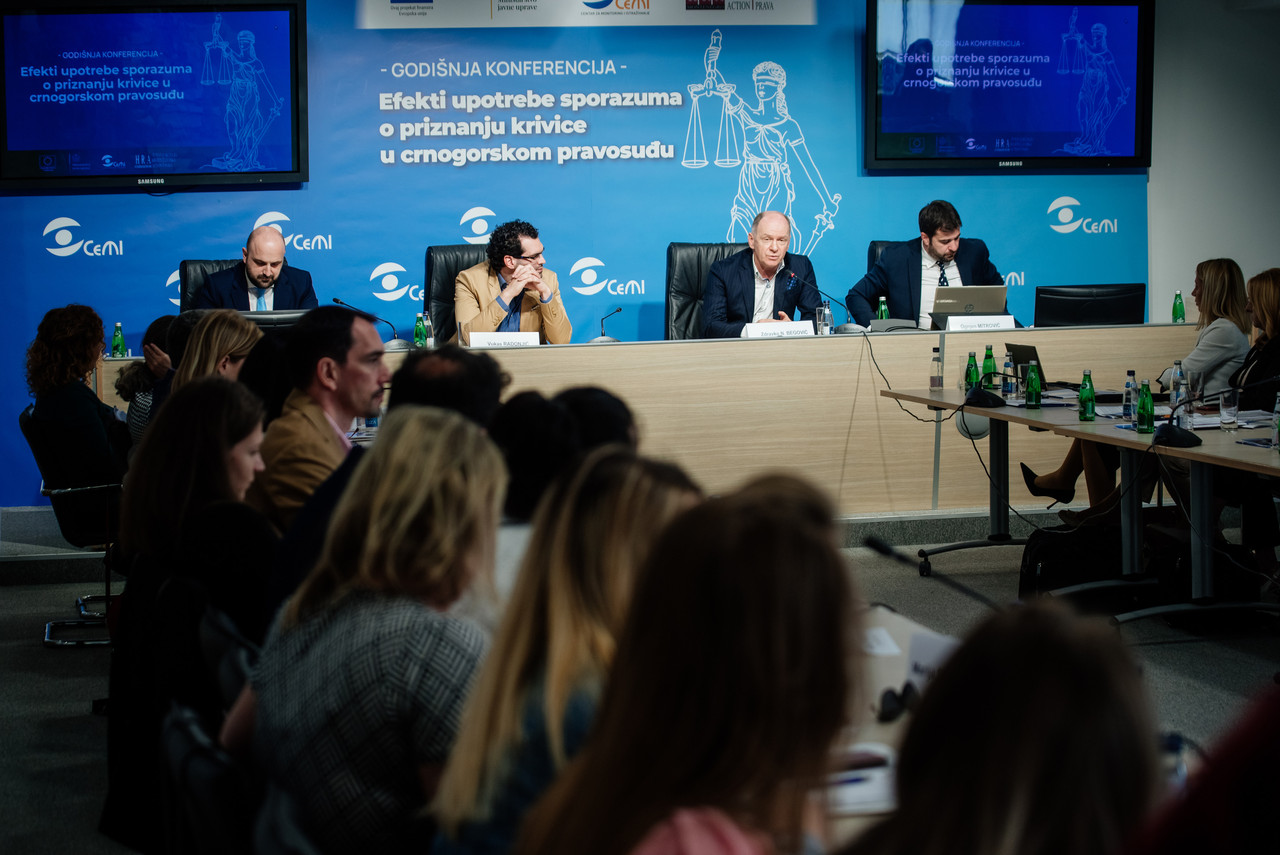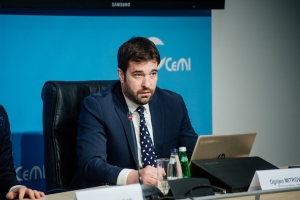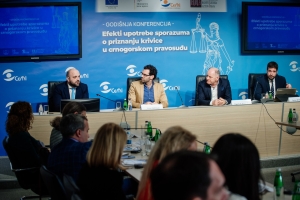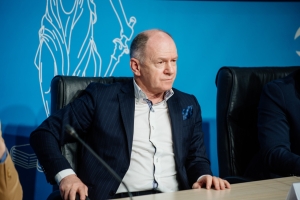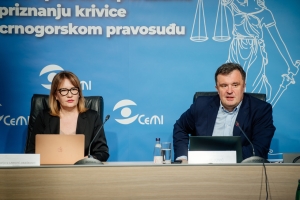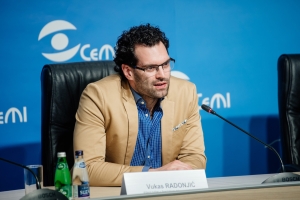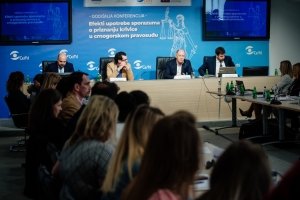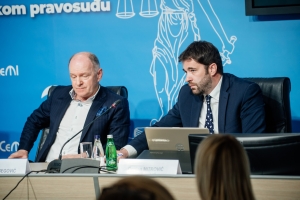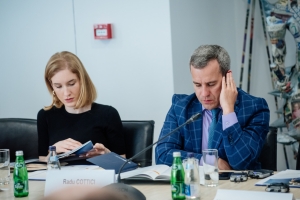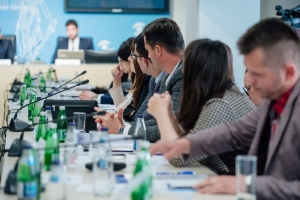The process of amending the Criminal Procedure Code needs to be completed as soon as possible in order to limit the possibility of implementing plea agreements for certain crimes, such as human trafficking, money laundering, aggravated murder and crimes against sexual freedom.
This was announced in the second part of the annual conference "Effects of the use of plea agreements in the Montenegrin judiciary", which was organized by the Center for Monitoring and Research (CeMI).
During the presentation of the report "Institute of Plea Agreements in Montenegrin Legislation and Practice - Analysis 2020-2023", President of the Governing Board of CeMI, Zlatko Vujovic, said that the plea agreement has been applied in Montenegro for 13 years.
"This institute was introduced into our criminal legislation with the aim of bringing new criminal proceedings to a faster end and reducing costs, without jeopardizing the interests of legality and fairness," stated Vujovic.
According to him, it is evident from the study that it was possible to speed up the completion of many criminal proceedings and reduce their costs.
"What opens up room for concern is whether the interests of legality and fairness are protected," said Vujovic.
He reminded that for three years now, the European Commission has been repeating the assessment of the excessive use of plea agreements, especially in cases of organized crime and high corruption, which makes criminal policy soft, leads to non-transparency and undermines the credibility of the judicial response in the mentioned areas.
"With the introduction of this institute, it was prescribed that the plea agreement could be applied to criminal offenses for which a penalty of up to ten years was threatened, so that with the changes that were made later, this interpretation would be expanded, so it is now possible for the most serious criminal offenses ", stated Vujovic.
The lawyer, Marijana Lakovic-Draskovic, reminded that the EC recommended for the year 2022 that in order to improve the effective use of agreements, it is necessary to develop guidelines, especially when it comes to concluding agreements in the Special State Prosecutor's Office, i.e. passing judgments by the Special Department of the High Court.
"The analysis covered the years 2020, 2021 and 2022, a sample of 541 judgments was used. Based on the analysis of all judgments, it is indisputable that this institute represents a specific tool for state prosecutors and judges for the efficient conduct of court proceedings, especially in light of the fact that the High Court in Podgorica, as well as the Magistrate Court in Podgorica, do not have a sufficient number of courtrooms," she stated. Lakovic-Draskovic.
She pointed out that according to the data from the annual reports on the work of the Prosecutorial Council and the State Prosecutor's Office from 2016 to 2021, there is a continuous increase in the concluded plea agreements, while in 2021 and 2022 there is a decreasing trend in the concluded agreements, i.e. judgments passed on the basis of the agreement.
"In 2016 In 2017, we had 167 concluded agreements, in 2017, 240, in 2018, 298, in 2019, 371, in 2020, 559, and in 2021, 290. This analysis was done before the publication of the report on the work of the Prosecutorial Council and the State Prosecutor's Office," she stated. is Lakovic-Draskovic.
She pointed out that the analysis of the judgments showed that the courts in a large number of cases applied the institute of mitigation of punishment, stating that they imposed punishments below the legally prescribed minimum.
"In the structure of criminal sanctions, punishments dominate, and in a significant part, punishments that are expressed in residential premises are noticed. It has been noted that state prosecutors conclude agreements with persons who have been convicted several times. We have a case where a person was convicted as many as 12 times. There were also cases where a person was convicted ten times, eight times, five times, while on the other hand, the courts accepted such agreements, which called into question the judicial system's achievement of all punishments," said Lakovic-Draskovic.
She pointed out that when evaluating the plea agreement, the courts must provide a clear and detailed explanation that the institute did not violate the rights of the injured party and that it is in line with the interests of fairness.
"We consider it important as soon as possible to complete the work on drafting amendments to the Criminal Procedure Act in a way that will limit the possibility of concluding a plea agreement for the criminal offenses of human trafficking, money laundering, aggravated murder, a criminal offense against sexual freedom, and especially if a criminal offense against sexual freedom committed to the detriment of a minor," said Lakovic-Draskovic.
She pointed out that it is important that verdicts based on plea agreements are published regularly and in a timely manner on the courts' website and that efforts be made to improve the internet portals of courts and state prosecutors' offices.
As part of the panel "How to improve the use of plea agreements in Montenegro", the State Secretary in the Ministry of Justice and member of the Prosecutor's Council, Bojan Bozovic, pointed out that through the work of working groups for amendments to the Code of Criminal Procedure, the Criminal Code brought together all those who deal with the plea agreement, in order to raise the normative part to a higher level.
"The fact is that we should not resort to this institute for certain criminal acts and for certain procedures." I hope that we will receive information as soon as possible from the European Commission regarding changes to this law. Recognizing the importance of the Criminal Procedure Law for every country, we hope to reach the highest quality solutions," said Bozovic.
He pointed out that through the changes to the plea agreement, they have foreseen and prescribed in more detail the items related to the inference procedure.
"Thus, among other things, we have foreseen that the proposal related to the conclusion of the plea agreement can be submitted only once. Likewise, the state prosecutor will inform the injured party about the contents of the agreement and obtain a statement from the injured party in the part of the agreement that refers to the costs of the criminal proceedings and the property-law claim," said Bozovic.
He explained that they predicted that the plea agreement should be submitted no later than the first hearing for the main trial before the court of first instance.
The President of the Bar Association, Zdravko N. Begovic, said that it is important for everyone to be careful when it comes to the plea agreement, so that the institute does not turn into what it was at the beginning.
"During the creation and adoption of that institute in our Criminal Procedure Code, a real campaign was made for two or three years to start with that agreement, because it was almost a dead letter." We only started with that agreement three or four years later, and the time has come to have more of it now. I am afraid that these guidelines will not lead to the fact that the agreement will no longer be applied," said Begovic.
He believes that the guidelines should make sense for the defendants and their clients.
"I am afraid that we will reach a situation from the beginning of the application of the agreement that no one will look at that institute and that we will have dozens and dozens of cases in the High Prosecutor's Office or in the High Court that will last for months and years because of 20 grams of marijuana or a kilogram of marijuana or because of five joints, which makes no sense at all," Begovic pointed out.
The state prosecutor in the Special State Prosecutor's Office, Vukas Radonjic, said that in his previous work practice he had not encountered the fact that the state prosecutor had initiated the conclusion of a plea agreement.
"If there were such proposals, they were not accepted either by the expert defense or by the defendant himself. As far as I know, all agreements were concluded according to the proposal of the defense. "In addition, agreements based on the proposal of the defense were concluded in situations where the suspected persons confessed to the criminal offense at the first hearing, after which the defense turns to the proposal for the conclusion of the agreement on the admission of guilt," said Radonjic.
He assessed that it is necessary to consider the possibility of whether the obligation to testify should be introduced within the framework of the agreement for the persons who conclude the agreement.
"That their hearing as a witness can be significant for establishing the truth." "I think that the purpose of all participants in the procedure is that no one is innocent to be convicted, and that the classroom of the criminal offense is sanctioned after a fair and legal procedure has been carried out," said Radonjic.
He pointed out that plea agreements are concluded, according to the current solution, by the first hearing for the main trial before the first-instance court, stating that he believes that deadline should be extended.
The project "Access to justice and human rights in Montenegro - trial monitoring project 2021-2023" is implemented by the Center for Monitoring and Research (CeMI), in cooperation with the Human Rights Action (HRA), and is financed by the European Union and co-financed by Ministry of Public Administration of Montenegro.
